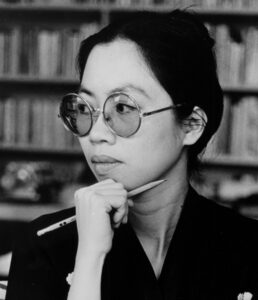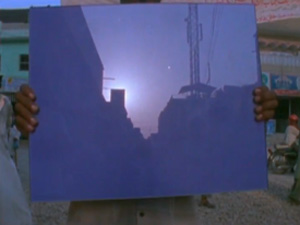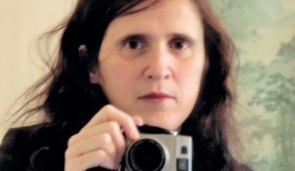Saturday 26th May 2012
Musée du quai Branly
Symposium/Debates – 10am to 6pm
Free Entrance, Auditorium
10am – Opening, introduction
Aliocha Imhoff & Kantuta Quiros (curators and art critics, Paris)
10:30am – Autoreflexivity and experimentation
As put forward by Catherine Russell in her breakthrough Experimental Ethnography (Duke University Press,1999) the crossing lines between ethnographic film and exprimental cinema provide wealthy meanings ; they even constitute some critical method to evade those stereotypes of the Other’s « discovery » and of the relation observer-observed. Experiencing the very « limits » of the filmic medium’s specificity, allows to foressee some new fieldwork apparatus, designed for multiple points of view ; renewing the combination between the gaze as formal construction and the sensible, non logocentric, experiences..
Moderator: Erik Bullot, filmmaker, theorician, ENSA Bourges – EESI
 Trinh T. Minh Ha
Trinh T. Minh Ha, filmmaker, theorician, University of California, Berkeley
The politics of form and forces
Trinh T. Minh-ha (Hanoi, Vietnam, 1952) is a Vietnamese-American filmmaker, anthropologist, composer, feminist and post-colonial theorist. In her work, she does not simply challenge traditional notions of alterity; she takes the feminist and post-colonial principles of diversity and decentering further in advocating for a rhetoric of continual readjustment. Notably, she introduced the notion of the “inappropriate/d other” to designate a figure that is at once “inappropriable” and “inappropriate.” This paradigm informs her films, which develop an experimental ethnography. She taught at the National Conservatory of Music in Dakar, Senegal (1977-80); at universities such as Cornell, San Francisco State, Smith, and Harvard, Ochanomizu (Tokyo); and is Professor of Women’s Studies and Rhetoric (Film) at the University of California, Berkeley.
 Karen Mirza & Brad Butler
Karen Mirza & Brad Butler, artists, London
The Exception and the Rule
Karen Mirza and Brad Butler’s multi-layered artistic (filmmaking, drawing, installation, photography, performance, publishing and curating) is fully engaged with challenging and interrogating concepts such as participation, collaboration, the social turn, and the traditional roles of the artist as producer and the audience as recipients. Currently this is taking the form of a project they have initiated called: ‘The Museum of Non Participation’. Their film and video installations question the filmic, sculptural and architectonic qualities of the moving image. Karen Mirza and Brad Butler have been actively involved in the London art scene as well as participating in exhibitions of leading institutions in Europe and Abroad (Serpentine Gallery, Whitechapel Gallery, ZKM, Centre Pompidou, among others) and biennials. Brad Butler has notably a doctorate in Experimental Ethnography from the London College of Communication. His doctoral research considers the potential cross-fertilisation of a structural film practice with experimental ethnography to challenge dominant assumptions about cultural representation in anthropology and to suggest ways in which anthropology can actively interrogate visual systems as a means of renewing the avant-gardism of structural film.
Morad Montazami, art historian, Paris
Juan Downey ou la naissance de l’ethnographie expérimentale
Morad Montazami est historien de l’art, boursier du musée du quai Branly en 2011-2012. En doctorat à l’École des hautes études en sciences sociales, où il travaille sur les « Poétiques et politiques de l’enquête dans l’art contemporain », il est l’auteur de plusieurs articles dans des ouvrages collectifs comme Face au réel. Éthique de la forme dans l’art contemporain (2008) ou Luciano Fabro. Habiter l’autonomie (2010), il a écrit sur les artistes Jordi Colomer, Jeremy Deller, Philippe Bazin, Peter Watkins, Allan Sekula, Walid Raad… Il collabore avec la revue ArtPress et il est le rédacteur en chef de la revue Zamân (Textes, images & documents).
14pm – Contracts and power relations
From within anthropology, and to begin with works by James Clifford or Georges Marcus (Writing Culture, University of California Press, 1986), numerous debates urged to « decolonize » the disciplinary or scientific look and control on the subjects « observed ». By pointing ethnography’s tendency for « hierarchical layout of discourses » (Clifford) or « co-temporality denial » (Johannes Fabian), theoretical basis are abundant. Therefore how do artistic strategies develop, in practice, to rethink authority issues (from dialogical discourses to polyphonic ones) and open collaborations that overtake the simple « on behalf of the Other » position, and eventually, does one manage to include himself in the same power structures he whishes to denounce ?
Moderator : Giovanna Zapperi, art historian, ENSA Bourges
 George Marcus
George Marcus, anthropologist, UC Irvine, California
The Near Future of the Ethnographic Form: Ethnocharrettes and Installations
George Marcus is an American anthropologist, founder of the journal Cultural Anthropology, the journal of the Society for Cultural Anthropology and a top journal in its field. In the 1990s, Marcus edited an eight-volume series of annuals called Late Editions: Cultural Studies for the End of the Century. In two seminal books which changed the face of ethnography and reimagine anthropology in terms, not only of methodology, but also of politics, ethics, and historical relevance, Writing Culture: The Poetics and Politics of Ethnography (published with James Clifford, 1986) and Anthropology as Cultural Critique (with Michael M. J. Fischer, 1986), Marcus argues that anthropologists typically frame their thoughts according to their own social, political and literary history, and are inclined to study people with less power and status than themselves. His projects continue to be explicitly collaborative and therefore interested generally in the nature of collaborations at the core of the contemporary practice of diverse ethnographic research. Marcus is interested in participating with the reinvention, of the norms and forms of the classic modality of research in social/cultural anthropology: fieldwork with the writing of ethnography as outcome. Marcus served as the Joseph D. Jamail Professor at Rice University, where he chaired the anthropology department for 25 years. He currently holds the position of Chancellor’s Professor at the University of California, Irvine, where he established a Center for Ethnography, devoted to experiments and innovations in this form of inquiry.
 Ariella Azoulay
Ariella Azoulay, philosopher and photograph, University of Tel-Aviv
Artist as citizen
Image theorist, curator, documentary filmmaker and author of numerous works on photography, Ariella Azoulay (Tel Aviv, Israel, 1962) is Academic Director of the Camera Obscura School of Art in Tel Aviv and teaches visual culture and critical theory at Bar-Ilan University. After graduating in Cinema and Literature from the University of Paris VIII in 1985, she studied Semiotics, Philosophy, and Museal Economy. Her publications include Death’s Showcase: The Power of Image in Contemporary Democracy (2001), Once Upon A Time: Photography Following Walter Benjamin (2005) and The Civil Contract of Photography (2008, MIT Press). She wrote and directed a trilogy of documentary films: A Sign from Heaven: a Film in 22 Letters Arranged in Alphabetical Order (1999), The Angel of History (2000), and Do not Open the Door (2001).
 Faye Ginsburg
Faye Ginsburg, anthropologist, New York
Australia’s Indigenous New Wave
Faye Ginsburg is Director of the Center for Media, Culture and History at New York University where she is also Kriser Professor of Anthropology and Co-Director of the Center for Religion and Media. Her work focuses on cultural activism as a mode of social transformation, from her film and award winning book on abortion activists in America’s heartland, to her longstanding collaborative research with Indigenous media makers worldwide. In 2005, she co-curated First Nations/First Features, a global showcase of “first” feature films by Indigenous directors worldwide, held at the Museum of Modern Art, NY; and the National Museum of American Indian, Washington D.C. She has written/edited five books, including Media Worlds: Anthropology on New Terrain (edited with Lila Abu Lughod and Brian Larkin, University of California), and is currently completing Mediating Culture: Indigenous Media in a Digital Age (Duke University Press).
 T.J. Demos
T.J. Demos, art historian, University of London, UCL
Poverty Pornography and Institutional Critique: The Case of Renzo Martens
T.J. Demos writes widely on modern and contemporary art and his essays have appeared in journals including Grey Room, October, Artforum, Texte zur Kunst, and Art Press. His published work centers broadly on the conjunction of art and politics, examining the ability of artistic practice to invent innovative and experimental strategies that challenge dominant conventions, whether representational, aesthetic, or social and political. His books include: The Exiles of Marcel Duchamp (MIT Press, 2007),; and Dara Birnbaum: Technology/Transformation: Wonder Woman (MIT Press/Afterall Books, 2010). T.J. Demos’ current work focuses on contemporary art, investigating in particular the diverse ways that artists have negotiated the recently emerging conjunction of political sovereignty and statelessness. He is presently completing two book projects: the first, provisionally titled The Migrant Image: The Politics of Documentary Art During Global Crisis (Duke University Press); the second, entitled Return to the Postcolony: Spectres of Colonialism in Contemporary Art (Sternberg Press).





